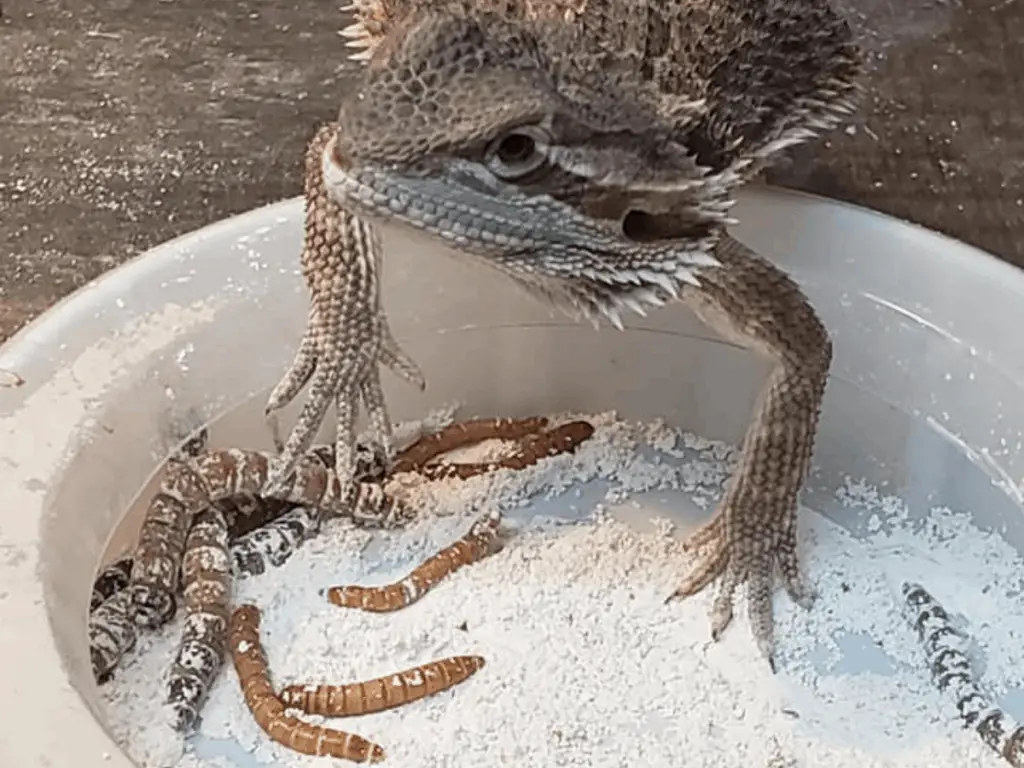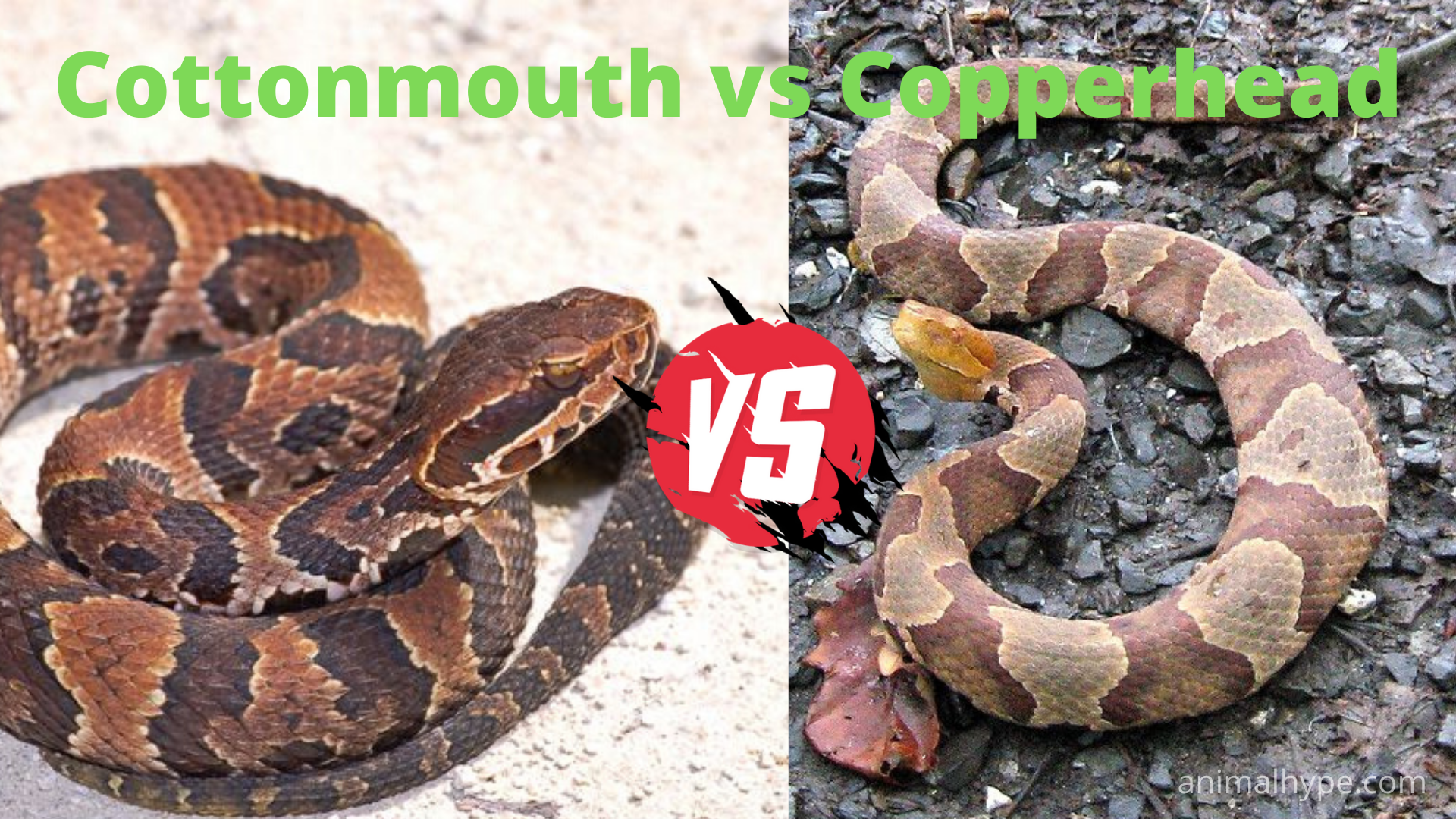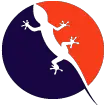Many people are looking for the ideal insects to feed their bearded dragons. There are several alternatives available if you’re looking for what’s best for your lizard. Mealworms are one of the most widely known feeder insects for amphibians and reptiles, and they are also among the simplest to raise, keep, and care for. These little creatures are also incredibly nourishing for frogs, bearded dragons, and other lizards. We will discuss “How many mealworms does a bearded dragon eat in one sitting” in this article. Let’s learn everything there is to learn about mealworms for bearded dragons.
Can Bearded Dragons Eat Mealworms?
Mealworms are the favorite diet of bearded dragons as they are one of their main sources of nutrition in the wild. Furthermore, these common feeder insects are rich in protein and make a healthy treat. Mealworms can be given as a treat on rare occasions, either live or freeze-dried. This is because they provide the nutrients that bearded dragons require.
They may safely consume mealworms after they hit the juvenile age (five to eighteen months) and prevent excessive weight gain and choking. However, your beaded dragon’s diet should contain a small amount of these mealworms.
Most bearded dragons will be able to recognize and enjoy live mealworms. Because live mealworms closely resemble the prey that beardies hunt and consume in their native environments, beardies love them.
Additionally, baby dragons might become overwhelmed while attempting to eat a wriggling mealworm because they are shy hunters. Furthermore, keep in mind that mealworms have a powerful bite that might harm your baby bearded dragon.
Mealworms are only acceptable as a rare treat due to their high phosphorus, fat content and tendency to create intestinal obstructions.
Can Bearded Dragons Eat Dead Mealworms?
Put the dead mealworms in the garbage. They no longer have a favorable nutritional profile and won’t help your bearded dragon. Additionally, they will be difficult for your lizard to consume because the fluid content will have dried. It is important to know the insects that bearded dragons consume in these situations to find other feeder alternatives.
Can Bearded Dragons Eat Dried Mealworms?
Yes, they are. Mealworms could be freeze-dried or naturally dried. Although some of the nutrients may be lost, you can buy them at the pet shop for a cheaper cost and they have a longer shelf-life. They should only be fed moderately to fully mature bearded dragons.
Can Bearded Dragons Eat Mealworms Beetles?
Yes, in moderation, you may give your beardie mealworm beetles. When housed at room temperature, these beetles grow following mealworm metamorphosis. They will measure 12 to 18 mm in length and 4 to 6 mm in width. These insects’ softer bodies are simpler for bearded dragons to digest. However, mealworm beetles are the ideal treat because they are rich in protein and low in fat. Feeding 5 to 6 mealworms per week is the ideal feeding plan, and you shouldn’t force-feed a bearded dragon if it doesn’t enjoy the flavor of mealworm beetles.
How Many Mealworms Does a Bearded Dragon Eat in One Sitting?
The amount a bearded dragon consumes in one sitting truly depends on its age and weight. However, on average, a bearded dragon will eat one to two mealworms once or twice a week as they are 5-months old.
Many bearded dragon diets include mealworms as a standard; however, you might be concerned about how many mealworms a bearded dragon needs to survive. The bearded dragon must be a juvenile when you give it mealworms. Give them to just baby mealworms if they are juvenile (feed them 2 to 3 mealworms once a meal). Once they reach adulthood, you must provide them with 5 to 6 mealworms once a meal. You should give them fewer mealworms and other fatty treats as they need to consume more greens. Pregnant beardies can consume more because their bodies require more food than usual.
Although bearded dragons love to eat mealworms, you shouldn’t give them as much as they want.
How to Feed Mealworms to Your Bearded Dragon?
You may give mealworms to your Bearded Dragon in two ways:
- Firstly, you could start by hand-feeding them mealworms. You have a fantastic chance to develop a bond with your bearded dragon during this time. You may feed the mealworms to your bearded dragon using tweezers or by hand. Bearded dragons may bite, so keep that in mind. Although they are not hostile, they could accidentally nip your finger if you hand-feed them.
What are the Benefits of Mealworms for Bearded Dragons?
There are several things to take into account while choosing the optimal food for your bearded dragon. You must be sure to provide your bearded dragon with the best care possible to ensure their quality of life and health. Mealworms can have very beneficial effects on beardies when given to them in the proper quantities. Here is a table outlining the mealworms’ nutritional profile:
Nutrients | Values |
Moisture | 62% |
Protein | 20% |
Fat | 13% |
Carbohydrate | 3% |
Ash | 1% |
Cholesterol | 150 mg |
Calcium | 13.33 mg |
High Protein Level:
Bearded dragon growth is aided by protein. Younger ones may have a greater need for it and a greater appetite for insects as a result. Proteins serve as essential building elements for bearded dragons and are often composed of amino acid chains. In particular, proteins are essential for the growth of muscles, enzymes, and antibodies, particularly in juvenile bearded dragons.
The amount of protein consumed throughout the initial years of a bearded dragon’s life will affect its eventual full size. So choosing mealworms based on their protein content is the proper choice. A bearded dragon’s health and lifespan depend on the protein choices made.
High Moisture Content:
The desert is the typical habitat for bearded dragons. They don’t require a lot of water to survive. Although, vegetables and other things, including mealworms, provide them with the majority of their water needs. These lizards, though, are dependent on the water in fruits, vegetables, and insects. As a result, mealworms are excellent hydrating insects for our bearded dragon.
Excellent Fat Content:
Mealworm fat directly helps bearded dragons in energy production. However having too much fat might lead to obesity, having a healthy amount keeps bearded dragons active. The more active they are, the leaner they get as a result of exercise. Lack of fat in the diet can result in lethargy, underweight bearded dragons, and a lack of motivation for bearded dragons to move around their habitat.
Perfect Calcium Source:
Your bearded dragon is most likely to exhibit signs of sickness if it is calcium deficient. Bearded dragons need calcium to build strong bones and muscles. A lack of calcium in a bearded dragon’s diet can result in muscle twitching, leg swelling, and fragile bones. Long-term consequences include bearded dragons having irreversible malformations in their limbs, spine, tail, or jaw. If your bearded dragon has deformities, it’ll be stagnant. They won’t have free access to water and food due to stagnation.
However, keep in mind that this is enough; therefore you must increase the supplement to prevent calcium deficiency. Calcium carbonate tablets can be purchased and made into powder. Ensure that the mealworms have the calcium dust sprinkled on them before giving your dragon.
Quiet Staple Insects:
Most bearded dragon keepers will like the mealworms’ quiet nature. Mealworms are also not smelly and cannot escape from the small dish in which you feed your lizard. The bearded dragons’ active nature stimulates their hunting tendencies, and they will enjoy pouncing on insects.
Drawbacks of Mealworms for Bearded Dragons:
- The harder chitin shell of the mealworm, which is indigestible to bearded dragons, is a major disadvantage. Additionally, it gets slightly more difficult to bite into and chew.
Mealworms should only be consumed as a treat because of this. Because of the relative size of their intestines, small bearded dragons are particularly vulnerable to impaction (gut obstruction, which is always lethal), and mealworms are often unsuitable as a regular food source for them.
Note: The hard shell is what gave rise to the mealworm myth. Some people think that some of them could survive being eaten because of their hard shells, and the insect will then consume itself from inside the reptile. Although frightening, this is a total myth that has never happened.
- Obesity might result from consuming a lot of mealworms as food. However, you may spoil your bearded dragon during pregnancy by slightly increasing the number of worms, as their growing bodies require more food than usual.
Why Your Bearded Dragon is Not Eating Mealworms?
The following reasons might apply if your bearded dragon isn’t eating mealworms:
- Shedding
- Poor enclosure conditions (e.g., low temperature)
- Parasite attack
- Sickness
- Impaction
- Brumation
- Stress
Insects that your beardie like, such as mealworms, can be combined with vegetables. Visit the veterinarian if they don’t work.
Precautions and Considerations:
Mealworms have a high fat and phosphorus level compared to their protein and calcium content, therefore you must take caution while feeding them to your dragon. Bearded dragons are unable to absorb calcium due to high phosphorus levels. In severe circumstances, your bearded dragon can develop a bone condition called metabolic bone disease.
It could be difficult for your beardie to lose the extra weight if they consume too many mealworms. Domesticated bearded dragons do not get as much exercise as wild ones. Furthermore, feeding feeder insects to bearded dragons daily is a difficulty in and of itself for individuals who keep them.
The worms are similar to fast food for mealworms in that they are beneficial if consumed in moderation, but harmful if a person develops a habit of them. Greens should be more than meats in your beardies’ diet.
Helpful hint: Mealworms are so tasty that most pet lizards may become addicted to them and refuse to eat anything else. Because of this, it is recommended that you only give them to your bearded dragons sometimes as a treat to strengthen your bond.
Conclusion:
We hope you enjoyed learning about “How many mealworms does a bearded dragon eat in one sitting.” The size and age of your beardies will determine this. This is because that bearded dragons frequently choke on large chunks of food. However, five to six mealworms can be fed to adult bearded dragons either once or twice a week. Juvenile bearded dragons, on the other hand, may consume more if the mealworms are small enough to ingest safely. Never feed mealworms to baby bearded dragons. Your lizard will enjoy eating these insects, but only in small amounts.
FAQs:
Mealworms should be introduced to your bearded dragon during the juvenile period. This stage is often reached when the lizard is 5 to 18 months old.
No, bearded dragons shouldn’t regularly consume mealworms. Mealworms should only be offered in small amounts to beardies, even adults. Due to their hard shell, mealworms might be hazardous if eaten frequently.
It’s not recommended to give wax worms to bearded dragons. Waxworms have a high-fat content, making them bad for baby beardies. As an alternative, give crickets to your baby bearded dragons.
Mealworms are not poisonous to bearded dragons. They have high fat and low calcium content. They should only be utilized as a rare and supplemental treat for adult dragons that can handle them because they are difficult for young bearded dragons to digest and may get them unwell.








